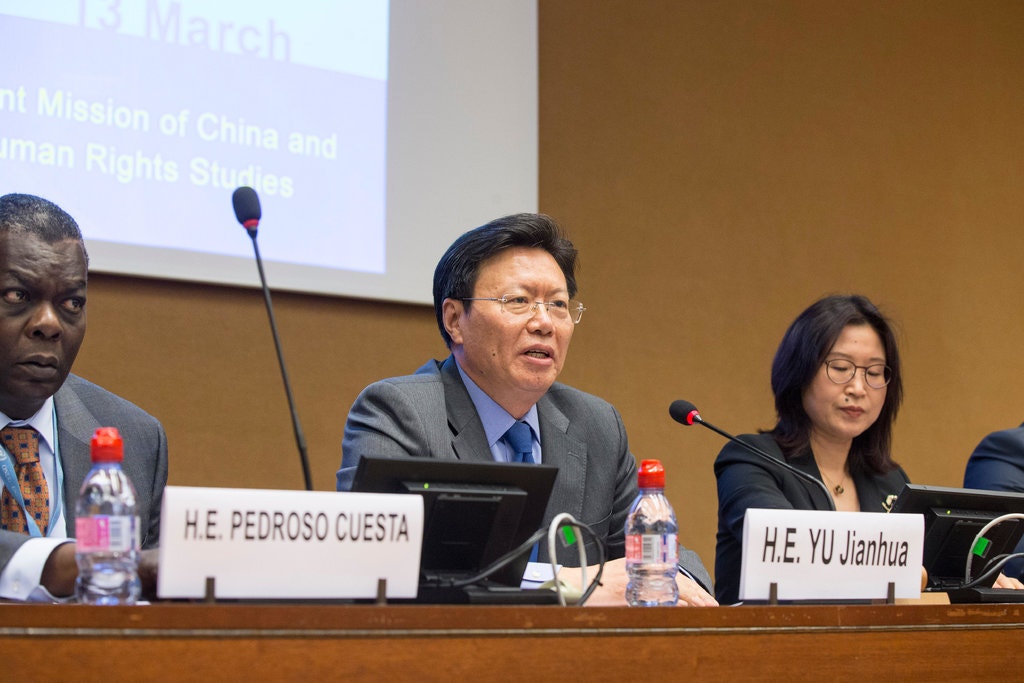Media Report

- The New York Times reports, "Two weeks before talks between the United States and China broke down, Beijing quietly called one of its most formidable trade negotiators out of a pre-retirement posting. The negotiator, Yu Jianhua, a 28-year veteran of trade talks with American officials and at the World Trade Organization, returned to Beijing in mid-April from his position as China's ambassador to the United Nations' offices in Geneva. With his appointment, the Chinese government began to address an experience gap that could be holding it back as it tries to resolve a potentially devastating trade war with the Trump administration. It is unclear how or whether a previous lack of trade-policy experience on China's negotiating team contributed to the breakdown in negotiations last month. American officials walked away from the talks after their Chinese counterparts deleted page after page of provisions from a draft pact."
- The Wall Street Journal reports, "China signaled no retreat from pursuing legislation to allow extradition from Hong Kong, despite a massive weekend protest against the proposed law in the Chinese territory. In comments from officials and in state media on Monday, Beijing vowed sustained backing for the Hong Kong government's efforts to amend its extradition laws, which exclude mainland China. It attributed the mass protest—which organizers say brought more than one million people onto Hong Kong streets Sunday—to local dissidents colluding with foreign powers to incite public anger.In affirming Beijing's support for the legislation Monday, a Chinese Foreign Ministry spokesman alluded to foreign critics he didn't name. 'Some sides have been making irresponsible remarks' about the proposed amendments, spokesman Geng Shuang said at a routine weekday briefing. 'We firmly oppose external intervention in Hong Kong's legislation.'"
- Bloomberg reports, "Alphabet Inc.'s Google is moving some production of Nest thermostats and server hardware out of China, avoiding punitive U.S. tariffs and an increasingly hostile government in Beijing, according to people familiar with the matter. Google has already shifted much of its production of U.S.-bound motherboards to Taiwan, averting a 25% tariff, said the people, asking not to be identified discussing internal matters. While U.S. officials have pinpointed Chinese-made motherboards as a security risk, Google didn't bring that up during discussions with its suppliers, they said. Tariffs have also pushed American-bound production of its Nest devices to Taiwan and Malaysia, the people said. The migration is taking place as companies both foreign and domestic seek to pivot their production away from China amid U.S. President Donald Trump's efforts to reset the perimeters for global trade and manufacturing."
Calendar
- 2019-06-10 More than 1 million protest in Hong Kong, organizers say, over Chinese extradition law
- 2019-06-07 Outrage in Hong Kong as Extradition Plan Exposes Deep Fears of China’s Rule
- 2019-06-06 Trump to decide on $300 billion China tariffs after G20 meeting
- 2019-06-05 Ford Is Fined in China as Trade Fight With U.S. Rages
- 2019-06-04 A Slower Economy. A Trade War. Now, China Faces Rising Food Prices.
- 2019-06-03 China warns students about ‘risks’ of going to the U.S. in the latest twist to the trade war
- 2019-06-02 China Signals It Is Willing to Return to Trade Talks With US
- 2019-05-31 China says it will blacklist ‘unreliable’ companies and individuals in response to technology ban
- 2019-05-30 China Puts U.S. Soy Buying on Hold as Tariff War Escalates
- 2019-05-29 Huawei files motion to block U.S. ban, calling it an affront to global human rights
News
- The New York Times China Moves to Close Gap in Trade Expertise as Clash With Trump Intensifies
- The Wall Street Journal Beijing Digs In on Hong Kong Extradition Bill
- Bloomberg Google Is Moving More Hardware Production Out of China
- CNBC As US-China relations sour, Taiwan's value as a 'chess piece' may rise
- Reuters U.S. seeks to help countries boost key minerals' output to reduce reliance on China
- Reuters Hong Kong braces for new mass protests against planned extraditions to China
- Bloomberg Trump Says He's Holding Up Trade Deal With China Ahead of G-20
- Reuters Top Japanese chip gear firm to honor U.S. blacklist of Chinese firms - executive
- Bloomberg Mexico's Foreign Minister Plans China Visit After G-20 Meetings
- Bloomberg Luckin Coffee's Growth Prospects Generate a Buzz Amongst Analysts
- TIME Chinese Tech Giant Huawei Hints That U.S. Pressure Is Hurting Sales
- CNBC Trump says the US needs a 'fair playing field' against China's weaker currency as yuan hits lows of the year
- The New York Times As China Looms, Australia's Military Refocuses on Pacific Neighbors
- The New York Times New Zealand Court, Blocking Extradition, Is Latest to Rebuke China's Judiciary
Commentary
- The New York Times The Hong Kong Protests Are About More Than an Extradition Law
- Bloomberg China Risks, Unlike Mexico Tariffs, Aren't Vanishing
- Bloomberg China and Russia Want to Control the 'World Island'
- CNBC The White House needs to clarify its position on Huawei
- The Wall Street Journal China's Million New Dissidents
- The Economist China seems deaf to mass protests in Hong Kong over extradition
